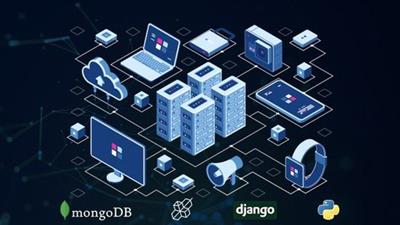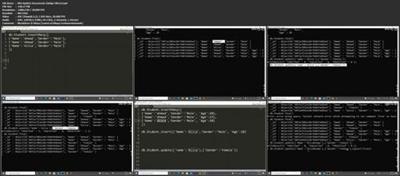Genre: eLearning | MP4 | Video: h264, 1280x720 | Audio: AAC, 44.1 KHz
Language: English | Size: 4.92 GB | Duration: 11h 48m
MongoDB- Master MongoDB Development Applications, MongoDB with Python, MongoDB with Django, MongoDB with NodeJs, etc.
What you'll learn
● Introduction to MongoDB and its importance.
● Why is MongoDB such a popular field nowadays?
● The important concepts from the absolute beginning with comprehensive unfolding with hands-on examples in MongoDB.
● Practical explanation and live coding with MongoDB.
● MongoDB CRUD.
● MongoDB Query Operators.
● MongoDB Projection Operators.
● MongoDB Update Operators.
● MongoDB cluster on Atlas.
● MongoDB with Node.
● Performing CRUD operation with Node in MongoDB Atlas.
● Understanding MongoDB with Python.
● Performing CRUD operation with Python in MongoDB Atlas.
● Understanding MongoDB with Django.
● Performing CRUD operation with Django in MongoDB Atlas.
● Building APIs for CRUD operations in MongoDB through Django.
● Understanding MongoDB with PySpark.
Description
Comprehensive Course Description:
MongoDB, a fast and scalable NoSQL database, is extremely popular right now. This object-oriented database is simple and dynamic. And the demand for MongoDB developers is very high.
In this course, you start by becoming proficient in the elementary concepts of MongoDB, including installing MongoDB, setting up MongoDB Atlas, and understanding the database structure of MongoDB, the collection structure of MongoDB, document structure of MongoDB, and the basic Mongo commands.
Next, you'll explore the Basic, Create, Read, Update, and Delete operations in MongoDB. You'll then explore in detail the MongoDB query operators and project operators. Following that, you'll learn about MongoDB update operators. In the concluding modules, you'll explore MongoDB with Node and Python.
In the final module, you'll sharpen your practical knowledge of the theoretical concepts you learned in this course by working on two mini-projects. In the first project, you'll work on MongoDB with Django, in which you'll develop a CRUD-based application using Django and MongoDB. In the second project, you'll implement an ETL pipeline using PySpark to dump the data in MongoDB.
MongoDB for Absolute Beginners is an interactive learning course that reflects the most in-demand skills. This course will help you understand the concepts and methodology with regards to MongoDB in a simple way.
The course tutorials are divided into 160+ brief HD videos. The total runtime of the videos is around 12 hours. The course is:
* Easy to understand.
* Exhaustive.
* Practical with live coding.
* Comfortably paced.
* Full of challenging quizzes with solutions.
* Hands-on with coverage of the latest developments in the field.
This course is designed for absolute beginners. As a newbie in this field, you'll spend sufficient time to gain a thorough understanding of the fundamental concepts. You'll then make steady progress with a lot of practical implementations where each step will be dealt with in great detail.
How Is This Course Different?
This course does not bog you down with boring traditional textbook theories. And regardless of your knowledge level or work experience, this course will get you up and running fast. The quizzes, exercises, and projects will challenge you to apply all the theoretical concepts you have learned.
The strong basic understanding you gain initially will help you move toward learning more advanced concepts. The exercise at the end of each module will make you think about the solution and pave the way for you to grasp the concepts. Compelling course material, high-quality video content, thought-provoking questions, and handouts are some of the perks. You can contact our friendly team in case you have any doubts related to the course content, and we assure you of a fast response.
Course Content:
This comprehensive course consists of the following topics:
1. Introduction
a. Overview
i. Understanding NoSQL
ii. Understanding MongoDB
iii. Comparison with trivial SQL databases
iv. Why we need MongoDB?
v. Advantages of using MongoDB
b. Installation
i. Installing MongoDB
ii. Setting up MongoDB Atlas
c. Major components
i. Database
1. Understanding database structure of MongoDB
2. Creating database
3. Traverse in database
4. Delete database
ii. Collection
1. Understanding collection structure of MongoDB
2. Creating collection
3. Traverse in collection
4. Delete collection
iii. Document
1. Understanding document structure of MongoDB
2. Creating document
3. Traverse in document
4. Delete document
2. Basic Mongo Operations
a. Understanding the basic Mongo Commands
b. Creating databases
c. View databases
d. Switching databases
e. Creating collections
f. View collections
3. Create Operation in MongoDB
i. Understanding Create Operation
ii. Understanding creating data in MongoDB
iii. Syntax of create statement
iv. Inserting one record
1. Creating one record at a time
2. Insert record in MongoDB
v. Inserting multiple records
1. Creating multiple records at a time
2. Insert records in MongoDB
4. Read Operation in MongoDB
i. Understanding reading data in MongoDB
ii. Query selectors & projection operators
iii. Reading one record at a time
iv. Reading multiple records at a time
v. Understanding Cursors
vi. Basic methods
vii. Basic filters
5. Update Operation in MongoDB
i. Understanding updating data in MongoDB
ii. Update one record
iii. Update multiple records
iv. Filtering fields
v. Finding and updating specific fields
vi. Replacing data
6. Delete Operation in MongoDB
i. Understanding deleting data in MongoDB
ii. Delete one record
iii. Delete multiple records
iv. Delete all elements in collection
7. Query and projection operators
i. Comparison
1. Matches values that are equal to a specified value.
2. Matches values that are greater than a specified value.
3. Matches values that are greater than or equal to a specified value.
4. Matches any of the values specified in an array.
5. Matches values that are less than a specified value.
6. Matches values that are less than or equal to a specified value.
7. Matches all values that are not equal to a specified value.
8. Matches none of the values specified in an array.
ii. Logical
1. Joins query clauses with a logical AND returns all documents that match the conditions of both clauses.
2. Inverts the effect of a query expression and returns documents that do not match the query expression.
3. Joins query clauses with a logical OR returns all documents that match the conditions of either clause.
iii. Element
1. Matches documents that have the specified field.
2. Selects documents if a field is of the specified type.
iv. Evaluation
1. Allows the use of aggregation expressions within the query language.
2. Performs a modulo operation on the value of a field and selects documents with a specified result.
3. Performs text search.
v. Array
1. Matches arrays that contain all the elements specified in the query.
2. Selects documents if an element in the array field matches all the specified conditions.
3. Selects documents if the array field is a specified size.
vi. Projection operators
1. Projects the first element in an array that matches the query condition.
2. Projects the first element in an array that matches the specified condition.
3. Limits the number of elements projected from an array. Supports skip and limit slices.
8. Update Operators
i. Fields
1. Sets the value of a field to current date, either as a Date or a Timestamp.
2. Increments the value of the field by the specified amount.
3. Only updates the field if the specified value is less than the existing field value.
4. Only updates the field if the specified value is greater than the existing field value.
5. Multiplies the value of the field by the specified amount.
6. Renames a field.
7. Sets the value of a field in a document.
8. Removes the specified field from a document.
ii. Array
1. Acts as a placeholder to update the first element that matches the query condition.
2. Acts as a placeholder to update all the elements in an array for the documents that match the query condition.
3. Acts as a placeholder to update all the elements that match the array Filters condition for the documents that match the query condition.
4. Adds elements to an array only if they do not already exist in the set.
5. Removes the first or last item of an array.
6. Removes all the array elements that match a specified query.
7. Adds an item to an array.
8. Removes all matching values from an array.
iii. Modifiers
1. Append multiple items for array updates.
2. Specify the position in the array to add elements.
3. Limit the size of updated arrays.
4. Reorder documents stored in an array.
9. MongoDB with NodeJs
a. Connect MongoDB with NodeJS
10. MongoDB with Python
a. Connect MongoDB with Python
11. MongoDB with Django (PROJECT)
a. Building a basic application in Django
b. Using Django library to connect Django with MongoDB
c. Creating a simple form to perform CRUD operations on the MongoDB
d. Display the data on the form
12. ETL Using Spark with MongoDB (PROJECT)
a. Reading data from MongoDB in Spark
b. Writing data from Spark to MongoDB
After completing this course successfully, you will be able to:
● Relate the concepts and practical applications of MongoDB with real-world problems.
● Implement any project from scratch that requires MongoDB knowledge.
● Know the theoretical and practical aspects of MongoDB.
Who this course is for:
● People who are absolute beginners and know nothing about MongoDB.
● People who want to come up with smart solutions.
● People who want to learn MongoDB.
● People who want to learn MongoDB along with its implementation in real-world projects.
● Data Scientists.
● Database Administrators.
● Database Engineers.
● Data Engineers.
Who this course is for:
● People who are absolute beginners and know nothing about MongoDB.
● People who want to come up with smart solutions.
● People who want to learn MongoDB.
● People who want to learn MongoDB along with its implementation in real-world projects.
● Data Scientists.
● Database Administrators.
● Database Engineers.
● Data Engineers.
Screenshots
Download link:Kod:rapidgator_net: https://rapidgator.net/file/1d837163b683c52ee23d1dbfbad3398f/q50ev.MongoDBMastering.MongoDB.for.Beginners.Theory..Projects.part1.rar.html https://rapidgator.net/file/66dc0b6fd6dbfc0d6730711474e4d9ea/q50ev.MongoDBMastering.MongoDB.for.Beginners.Theory..Projects.part2.rar.html https://rapidgator.net/file/5b21502d46547d2c99f9ef94cd039d25/q50ev.MongoDBMastering.MongoDB.for.Beginners.Theory..Projects.part3.rar.html https://rapidgator.net/file/3648d76673aca1107a0251eee9c1fe5e/q50ev.MongoDBMastering.MongoDB.for.Beginners.Theory..Projects.part4.rar.html https://rapidgator.net/file/e2f5586d7cf7827b627fffc2b864b15c/q50ev.MongoDBMastering.MongoDB.for.Beginners.Theory..Projects.part5.rar.html https://rapidgator.net/file/e16651007ba915a76894bb6c8c26970d/q50ev.MongoDBMastering.MongoDB.for.Beginners.Theory..Projects.part6.rar.html nitroflare_com: https://nitroflare.com/view/B0410AAA437E393/q50ev.MongoDBMastering.MongoDB.for.Beginners.Theory..Projects.part1.rar https://nitroflare.com/view/B7B75CF648712A8/q50ev.MongoDBMastering.MongoDB.for.Beginners.Theory..Projects.part2.rar https://nitroflare.com/view/133B29CB0C2CA04/q50ev.MongoDBMastering.MongoDB.for.Beginners.Theory..Projects.part3.rar https://nitroflare.com/view/7EB435F47C447A7/q50ev.MongoDBMastering.MongoDB.for.Beginners.Theory..Projects.part4.rar https://nitroflare.com/view/C0AB2C6FD5E7D91/q50ev.MongoDBMastering.MongoDB.for.Beginners.Theory..Projects.part5.rar https://nitroflare.com/view/15BC2DD70C93745/q50ev.MongoDBMastering.MongoDB.for.Beginners.Theory..Projects.part6.rarLinks are Interchangeable - No Password - Single Extraction
1 sonuçtan 1 ile 1 arası
-
21.08.2021 #1Üye



- Üyelik tarihi
- 20.08.2016
- Mesajlar
- 144.947
- Konular
- 0
- Bölümü
- Bilgisayar
- Cinsiyet
- Kadın
- Tecrübe Puanı
- 153
MongoDB-Mastering MongoDB for Beginners (Theory & Projects)
Konu Bilgileri
Users Browsing this Thread
Şu an 1 kullanıcı var. (0 üye ve 1 konuk)



 LinkBack URL
LinkBack URL About LinkBacks
About LinkBacks






 Alıntı
Alıntı
Konuyu Favori Sayfanıza Ekleyin